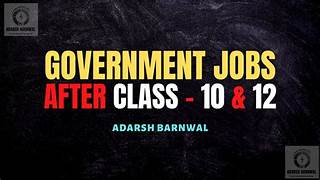Why Should Students Pursue Government Jobs After Completing 10th or 12th?
When students complete their Class 10 or Class 12 exams, they stand at one of the first major crossroads in life. It’s a time of excitement, possibilities, and a fair amount of confusion. While many go on to pursue higher education, a growing number of students — especially from semi-urban and rural areas — explore another rewarding path: government jobs.
For some, it may seem too early to enter the workforce. For others, especially those with financial constraints or a desire for early independence, a government job right after 10th or 12th is a golden opportunity. But is this really a wise decision?
Let’s take a closer, more human look at why students should consider government jobs after 10th or 12th, what the advantages are, and how it can shape a solid career path.
1. Early Financial Independence
Let’s be real — not every student has the luxury of spending 5-6 more years in education. Some families face financial pressure, and supporting the household becomes a priority. In such cases, cracking a government job exam after 10th or 12th provides an excellent chance to start earning early.
Even entry-level government jobs offer a steady income, regular salary increments, allowances, and pension benefits. Students who take up these roles not only support their families but also gain a sense of responsibility and purpose from a young age.
2. Job Security in an Uncertain World
In today’s competitive and unpredictable job market, job security is priceless. Private sector jobs often come with high stress, performance pressure, and the risk of layoffs. Government jobs, on the other hand, are known for long-term stability.
Once selected, a government employee usually enjoys lifetime job security unless there’s serious misconduct. This is especially important in uncertain economic times like recessions or pandemics, where private sector jobs can be volatile.
3. Respect and Social Status
Let’s not forget — government jobs carry immense respect in Indian society. Whether it’s a job in the police force, railways, post office, or as a clerk in a government office, it brings pride to the family.
In many towns and villages, people are known by their government job titles. A young person getting a job after 10th or 12th is often seen as responsible, dependable, and even marriageable! This respect can boost self-confidence and motivate young employees to work harder and aim higher.
4. Attractive Perks and Benefits
Government jobs don’t just offer a salary — they come with a package of perks that often outweigh the pay in private sector roles.
Some of these benefits include:
- Medical facilities for employees and their families
- Travel allowances and discounted railway/air tickets
- Housing benefits or government quarters
- Pension schemes for retirement
- Job transfers which allow working in different regions
- Paid leaves, maternity/paternity benefits, and national holidays
For a young person starting out, these perks can make life much more comfortable and secure.
5. Opportunities for Further Growth and Promotion
Just because you start working after 10th or 12th doesn’t mean your education or growth stops. Many government departments encourage their employees to study further through distance learning, part-time degrees, or internal training programs.
Moreover, almost every government job has promotion channels. For example, someone who starts as a lower division clerk can move up to higher levels like Section Officer or Under Secretary through departmental exams and experience.
By starting early, you also get more time to grow in your career — often retiring in a higher post with a better pension package.
6. Work-Life Balance
Many students don’t realize this early on, but work-life balance is crucial for a happy life. Unlike private companies that may demand late hours or weekend shifts, most government jobs follow fixed working hours.
This gives employees the chance to:
- Spend time with family
- Pursue hobbies or side interests
- Study for further exams or skill development
- Maintain better mental health and a stress-free lifestyle
For young people still figuring out their goals, such balance can be a blessing.
7. Wide Range of Options
Government jobs aren’t limited to one field. Even after Class 10 or 12, there’s a surprising range of roles you can apply for based on your interests, skills, and educational background. Some of the popular sectors include:
- Defense Services – Indian Army, Navy, Air Force (non-officer roles)
- Staff Selection Commission (SSC) – MTS, CHSL, GD Constable
- Indian Railways – Group D, RRB NTPC (for 12th pass)
- Banking – Clerical and Assistant posts
- Police Departments – Constable recruitment
- India Post – Gramin Dak Sevak (GDS), Postman
- Forest Departments – Forest Guard, Wildlife Protector
With a bit of research and effort, you can find a job that not only pays well but also matches your personal interests.
8. Opportunity to Serve the Nation
Many students are driven by the desire to do something meaningful. Government jobs, especially in defense, police, healthcare, and public services, allow young individuals to serve their communities and country.
Whether it’s delivering letters in remote areas, guarding the border, or helping people during natural disasters — government employees play a direct role in the functioning and safety of our society.
This sense of purpose and contribution is often missing in private-sector jobs and can be deeply fulfilling.
9. Minimal Educational Investment
Let’s face it — higher education is expensive. Engineering, medical, or management degrees can cost lakhs of rupees and take years to complete. And even after spending so much, there’s no guarantee of a job.
Government jobs, on the other hand, require a much smaller investment. Most exams are based on school-level subjects (General Knowledge, Math, English, Reasoning), and coaching is optional — though it can help.
For students from modest financial backgrounds, this makes government jobs a far more practical and affordable career path.
10. Gateway to Other Government Careers
Once you enter the system, you gain valuable insights into how things work. This experience can be leveraged to prepare for higher-level competitive exams like:
- SSC CGL (Graduate level jobs)
- UPSC (Civil Services)
- State PSCs
- Banking exams (PO level)
- Defense officer-level exams like NDA or CDS
In fact, many successful IAS or IPS officers started out as clerks, constables, or soldiers. Their early government job gave them the discipline, motivation, and financial support to aim higher.
Common Myths About Government Jobs After 10th or 12th
Let’s bust a few common myths:
- “Only average students go for these jobs.”
Not true. Many toppers choose stability and social service over corporate careers. - “There’s no career growth.”
Every job has promotional exams and higher responsibilities. - “Government jobs are boring.”
Not really. Whether you’re managing train operations, serving in defense, or assisting in disaster relief — many roles are exciting and impactful.
Final Thoughts
Choosing to go for a government job after Class 10 or 12 is not a compromise — it’s a smart, strategic decision for students who seek stability, respect, and long-term security.
With thousands of vacancies every year and competitive exams getting more transparent and merit-based, students from every background now have a fair shot. What it takes is consistent effort, awareness of opportunities, and a focused mindset.
Whether you wish to support your family, serve the country, or build a peaceful life with a good work-life balance, government jobs provide a pathway to all of it — and more.
So, if you’re standing at the crossroads after school and wondering what next, take a moment to consider this rewarding path. It might just be the best decision you’ll ever make.


